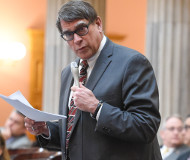4/13/2018
Ohio House Puts Financial Squeeze On Camera EnforcementOhio Senate to take up measure to eliminate profit motive from speed cameras following overwhelming House passage.

An overwhelming majority of Ohio lawmakers want to rein in the use of speed cameras and red light cameras in the state. By a 71 to 24 vote last month, the body approved a measure granting motorists more of a shot at a fair trial and cutting the state funding for municipalities that profit from automated ticketing. The Senate Judiciary Committee on Wednesday was assigned to review the proposal.
State Representative Bill Seitz (R-Cincinnati), the House majority leader, introduced the bill in response to the state Supreme Court majority's inserting itself into the public policy debate over automated enforcement. Justices last year struck down a compromise bill Seitz authored as a way to limit camera use (view ruling). The House's new approach bypasses the problems raised by the high court.
Under the proposal, municipalities using cameras would have to report to the state tax commissioner how much cash has been collected from motorists each year. The state would then deduct that amount from state aid payments to the city or town and direct the cash to a state fund dedicated to "enhance public safety" on roads and highways.
"We are simply determining that if jurisdictions choose to raise their revenue through issuing civil citations for red light/speed cameras, they need state money to that extent," Seitz said in a statement. "We are using our unquestionable power over the state budget to reallocate money to a state-run fund for road safety that was being expended for the benefit of those jurisdictions that rely on photo-enforcement revenues."
At present, most towns that run automated speed traps on the highway set up administrative hearings to handle any challenges to a ticket. These hearings are run by lawyers who answer to the local mayor. The new proposal would state that all traffic tickets must be heard in a municipal or county court. The change would most affect Brice, Newburgh Heights and Rutlands.
Some of these jurisdictions would not lose much under the fund-witholding provision. Newburgh Heights, for instance, pocketed $1,080,000 from speed camera fines but is only scheduled to receive $61,263 in state aid. Likewise, Brice risks losing $9969 if it keeps the photo ticketing program that has brought in $1.8 million in profit. Larger cities like Toledo, however, risk losing $2.3 million out of a $7.6 million aid payment.
The state Senate has yet to schedule a hearing on the House-passed proposal, a copy of which is available in a 150k PDF file at the source link below.


